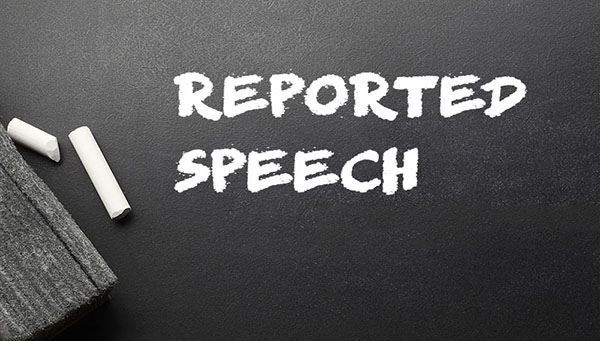
If the reporting verb is in the past tense:
| Tenses | Direct Sentence | Indirect Sentence | Tenses |
| Simple Pres.: | „I clean the windows every month.” | She said she cleaned the windows every month. | Simple Past |
| Pres. Cont.: | „I am cleaning the windows now.” | She said she was cleaning the windows at that time. | Past Cont. |
| Simple Past: | „I cleaned the windows yesterday.” | She said she had cleaned the windows the day before. | Past Perfect |
| Past Cont.: | „I was cleaning the windows from four to six yesterday.” | She said she had been cleaning the windows from four to six the day before. | Past Perf. Cont. |
| Present Perfect: | „I have cleaned the windows.” | She said she had cleaned the windows. | Past Perfect |
| Present Perfect Continuous | „I have been cleaning the windows for an hour.” | She said she had been cleaning the windows for an hour. | Past Perfect Cont. |
|
Past Perfect |
„After I had cleaned the windows I had a rest.” |
She said after she had cleaned the windows she had had a rest. |
Past Perfect |
| Past Perfect Continuous | „After I had been cleaning the windows for an hour I had a rest.” | She said after she had been cleaning the windows for an hour she had had a rest. | Past Perfect Cont. |
| Simple Future: | „I shall clean the windows tomorrow.” | She said she would clean the windows the next day. | Future in the Past |
| Future Continuous: | „I shall be cleaning the windows all day long tomorrow.” | She said she would be cleaning the windows all day long the next day. | Future Cont. in the Past |
| Fut. Perfect: | „I shall have cleaned the
windows by the time you comeback.” |
She said she would have cleaned the windows by the time you came back. | Future Perf. in the Past
|
| Modals
can must may needn’t |
I can clean the windows.
I must clean the windows. I may clean the windows. I needn’t clean the windows. |
She said she could clean the windows.
She said she had to clean the windows. She said she might clean the windows. She said she didn’t need to clean the windows. |
could
had to might didn’t need to |
| Imperative | Clean the widows.
Don’t clean the windows. |
She told me to clean the windows.
She told me not to clean the windows. |
to + infinitive |
| Requests | Will you clean the windows, please? | She asked me to clean the windows. | to + infinitive |
| Questions
Yes/No
Wh- questions |
Do you clean the windows everyday?
When do you clean the windows? |
She asked if/whether I cleaned the windows everyday.
She asked me when I cleaned the windows. |
If/whether -normal word order – time change
question word – normal word order – time change |
The following modals do not change:
SHOULD, WOULD, MIGHT, COULD, OUGHT TO, MUST HAVE
If the reporting verb is in the present tense, the tense of the sentence does not change.
If the reported statement is always true we do not change its tense.
E. g.: He said that cats don’t like dogs.





